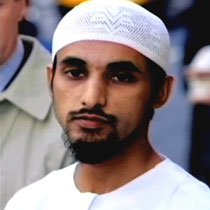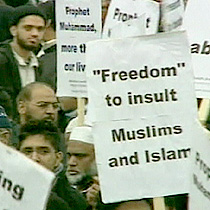2007年VOA标准英语-Muslim Man Faces Retrial on Charges Tied to 200(在线收听)
By Cathrine Drew
London
25 June 2007
Next week, a British court plans to re-try a 23-year-old Muslim man from North London on charges of inciting murder in connection to protests outside the Danish Embassy in London in February 2006. A jury already has found Mizanur Rahman guilty of stirring racial hatred. The case has revived arguments over anti-terrorism legislation versus free speech. It also has heightened a debate within Britain's Muslim communities. From London, Catherine Drew reports.

Mizanur Rahman
In early 2006, the firestorm of protest over cartoons satirizing the Prophet Mohammed reached Britain. No British newspapers reprinted the cartoons, which were originally published in Denmark.
Later in the year, police arrested four men under anti-terrorism laws which make it an offense to incite racial or religious hatred and violence.
At Mizanur Rahman's trial last year, prosecutors accused the 23-year-old Website designer of calling for British soldiers to be brought back from Iraq in body bags, and of saying he would like to see September 11th-style terrorist attacks across Europe.
 |
| Protesters say they should have the right to express their views |
So prosecutors are trying again to get a conviction on inciting murder.
While unable to speak about this specific case because of British legal restrictions, Sher Khan of The Muslim Council of Britain says he supports the prosecution of any demonstrators who have broken laws.
"I think in that scenario, it was totally unacceptable for those protesting to do so in that manner and I think if the law found they had put at risk a group of people because of that incitement then clearly that's a law that has to be applied."
However, while there's general agreement that Rahman's words were offensive, some liberal groups believe protesters should have the right to express their views and that these sorts of prosecutions stifle debate.
The debate about the right to freedom of speech versus speech that incites violence is the subject of a new documentary on Britain's anti-terrorism laws in the wake of the terrorist attacks against the United States in 2001 and the terrorist bombings in London in 2005. The low budget "Taking Liberties" is proving a commercial success. Many here have become cynical about anti-terrorism legislation. There is also widespread anger that the country went to war in Iraq on deeply flawed intelligence.
In such an atmosphere, Britain's Muslim community is also becoming more fractured. So much so that rights activists have launched a Council of Ex-Muslims of Britain. Similar groups already operate in Germany and in all the Scandinavian countries.
The head of the British group, Maryam Namazie, says the group was formed to fight the political Islam. "There is a distinction between Muslims and Islamists. The political Islamic movement is the work of the Islamists. The terrorists, terrorism is the work of the Islamists. It's not the work of Muslims."
The Council of Ex-Muslims say it is attracting thousands of followers, both in the U.K. and elsewhere. It says it will not be daunted by threats of violence from extremists.